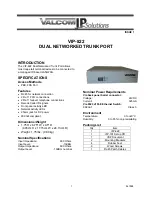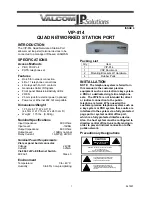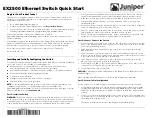
Data Sheet
© 2009 Cisco Systems, Inc. All rights reserved. This document is Cisco Public Information.
Page 1 of 5
Cisco SPS208G 8-Port 10/100 + 2-Port Gigabit SP Switch
Cisco Small Business Gigabit SP Switches
Service Provider–Focused Metro Access Solution Suited for MTU/MDU Applications
Highlights
●
Cost-effective access or customer premises equipment (CPE) switch for Metro Ethernet deployments
●
Comprehensive security features for robust multitenant separation
●
Optimized for triple-play (VoIP, video, and data) services
●
Service provider provisioning and management features
Figure 1. Cisco SPS208G 8-Port 10/100 + 2-Port Gigabit SP Switch
Product Overview
Cisco
®
SPS service provider switches deliver cost-effective Metro Ethernet access solutions. These products are
optimized for multitenant units (MTUs) and multidwelling units (MDUs) in which the service provider delivers triple-
play (voice over IP [VoIP], video, and data) services to multiple businesses or homes in close proximity.
The Cisco SPS208G 8-Port 10/100 + 2-Port Gigabit SP Switch (Figure 1), with its combination of intelligence and
small size, is ideal for space-constrained environments in which security and uptime are important. It offers a Gigabit
copper or Small Form-Factor Pluggable (SFP) module for an optional optical interface for connecting to the core
network.
The Cisco SPS switches facilitate the delivery of multiple services over a Layer 2 network with support for Q-in-Q
stacking. This feature allows customer VLANs to be kept separate across the service provider backbone. Also, for
efficient delivery of multicast traffic (such as video) to multiple customers, these switches provide support for a
variation of Multicast VLAN Registration (MVR).
Network security is a primary concern for service providers, and the SPS switches deliver a number of advanced
features that alleviate this concern. Support for dynamic Address Resolution Protocol (ARP) inspection eliminates
the man-in-the-middle attack. IP Source Guard prevents a subscriber (or malicious user) from using an IP address
not assigned to them. DHCP Guard keeps rogue devices from behaving like Dynamic Host Configuration Protocol
(DHCP) servers. Spanning Tree Protocol (STP) Root Guard prevents a rogue spanning tree device from advertising
that it should be the root bridge, thereby having the spanning tree network compromised by an outside device.
Unauthorized access to the network is protected through 802.1X port and multisession authentication and MAC
filtering/port security. The 802.1X standard requires clients to authenticate themselves before the port will pass data
for them. An additional security feature is access control lists (ACLs), which restrict network use to certain users,























